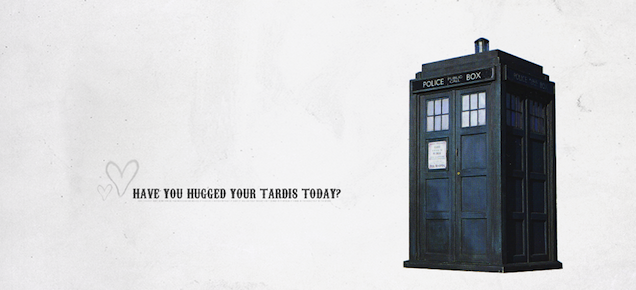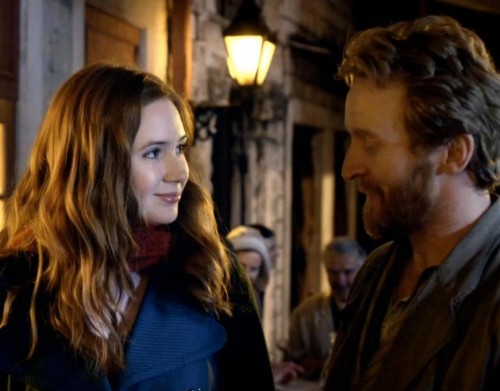
With the recent wave of BBC programs appearing on PBS (Downton Abbey, The Hour, Mr. Bean) it’s somewhat surprising that the 49 year old mainstay Doctor Who hasn’t enjoyed the same popularity. With time travel, aliens, and revisiting historical events, what’s not to like? Either way, this is a major oversight.
 But I digress… a quick summary of the show’s premise and plot. The Doctor is a time traveler who has made it his mission to protect Earth from the multitude of extraterrestrials who threaten humanity, both in the past and future. Helping him in this quest is his the adventurous assistant Amy Pond. In Vincent and the Doctor, the Doctor notices a sinister, alien grimace within one of Vincent van Gogh’s paintings. He and Amy set off for 1890 Paris to investigate. What they find is a van Gogh who is the laughing stock of the entire town of Auvers-sur-Oise. Suffering from extreme depression, he has no money, friends, or family, and no one will buy his paintings. On top of all that, van Gogh is “hallucinating” to see a deadly alien lurking around town. Enter the Doctor and Amy to save the day (spoiler!).
But I digress… a quick summary of the show’s premise and plot. The Doctor is a time traveler who has made it his mission to protect Earth from the multitude of extraterrestrials who threaten humanity, both in the past and future. Helping him in this quest is his the adventurous assistant Amy Pond. In Vincent and the Doctor, the Doctor notices a sinister, alien grimace within one of Vincent van Gogh’s paintings. He and Amy set off for 1890 Paris to investigate. What they find is a van Gogh who is the laughing stock of the entire town of Auvers-sur-Oise. Suffering from extreme depression, he has no money, friends, or family, and no one will buy his paintings. On top of all that, van Gogh is “hallucinating” to see a deadly alien lurking around town. Enter the Doctor and Amy to save the day (spoiler!).
The alien drama is interesting and all, but the real heart of the episode is Van Gogh and his depression. While he is enthralled with the beauty he sees in the world, he’s simultaneously overcome by his professional failure and social estrangement. Forget the alien, it’s van Gogh who really needs saving. To that end, the Doctor and Amy decide that they will take van Gogh to the modern day Musée d’Orsay to show him that history will remember him positively. The show really pours it on thick here. The museum guide even goes so far as to call him “not only the world’s greatest artist but also one of the greatest men who ever lived.” Though he is now ridiculed and ignored, he will one day be esteemed for his gifts. His present suffering is nothing in compared to his future legacy.
Now, does this knowledge of future glory spawn a renewed creative vigor? Does van Gogh attack life with a vigor in the hope that his work will not be in vain? Unfortunately, no. Just like in real life, the van Gogh of Doctor Who still commits suicide a few months later. As moving it was to know that his work will one day be appreciated, it doesn’t seem to be enough.

In my mind, this says something powerful about the ephemeral character of a hope which has its basis in a wholly future reality. The Doctor and Amy don’t offer him anything in his present to console him and lighten his burden. They show him a glimpse of the future, but then they leave him and his life in the present almost exactly how they found it.
This dynamic between the present and the future is a theme taken up in Christian theology in what is called eschatology, or the kingdom of God. As it is often presented, this describes as a certainty the future salvation/recreation of the world. Therefore, the Christian eagerly awaits and longs for a time when all is well and there are no more tears and pain. While that may sound nice, Vincent and the Doctor demonstrates that there is no certain salutary path from the future back to the present. Time only moves forward and the mere suggestion that everything will turn out okay can often seem like nothing more than an empty platitude.

However, this is not the only avenue explored by this episode of Doctor Who, but another way is faintly suggested. When Amy arrives in 1890, she is the only one who shows van Gogh kindness and generosity. So of course, he takes an instant liking to Amy and her ginger hair. Perhaps most surprisingly, van Gogh even proposes to her and promises that they’d have ‘dozens’ of children. This statement is the only real glimmer of hope expressed by van Gogh in the entire episode. He finds love and instantly makes plans for the future, with no regard for his professional failures or social banishment. Love creates genuine hope.
And so if Vincent and the Doctor shows us anything, it’s that it’s not enough to imagine a future when things are put to right and eagerly await its realization. Sometimes to future remains the future. Therefore the preaching of Christian hope which seeks to locate the Christian within the larger temporal framework of God’s plan must not do so with seemingly empty promises of future certainty, but with a backwards eye to the true Doctor who healed the sick and his present consolation to us weary sinners.

COMMENTS
4 responses to “Doctor Who, Vincent van Gogh, and the Limits of Future Hope”
Leave a Reply













This is an interesting piece, not only because I love the Dr., but also because it touches on the sermon I’m currently working on (from 1 Kings 17). I’m navigating the age-old problem of delivering the promise of God’s forgiveness, love, and care, preaching that God provides for our daily needs, without giving the mistaken impression that Christians never starve.
It sounds like you’re in the thick of it, trying to articulate the life of faith. I hope the sermon goes well!
I skipped the summary—my wife and I are catching up, but still only in season 3—but while Downton Abbey may have more “mainstream” popularity, I think you may not realize just how popular the Doctor actually is. Among my set of friends, Doctor Who vastly outperforms any of the other shows you mentioned. 😉 The sci-fi trappings can be off-putting to some folks; the poor quality of the first two or three episodes of the revival even more. But among even slightly nerdy folks, the Doctor has plenty of fans.